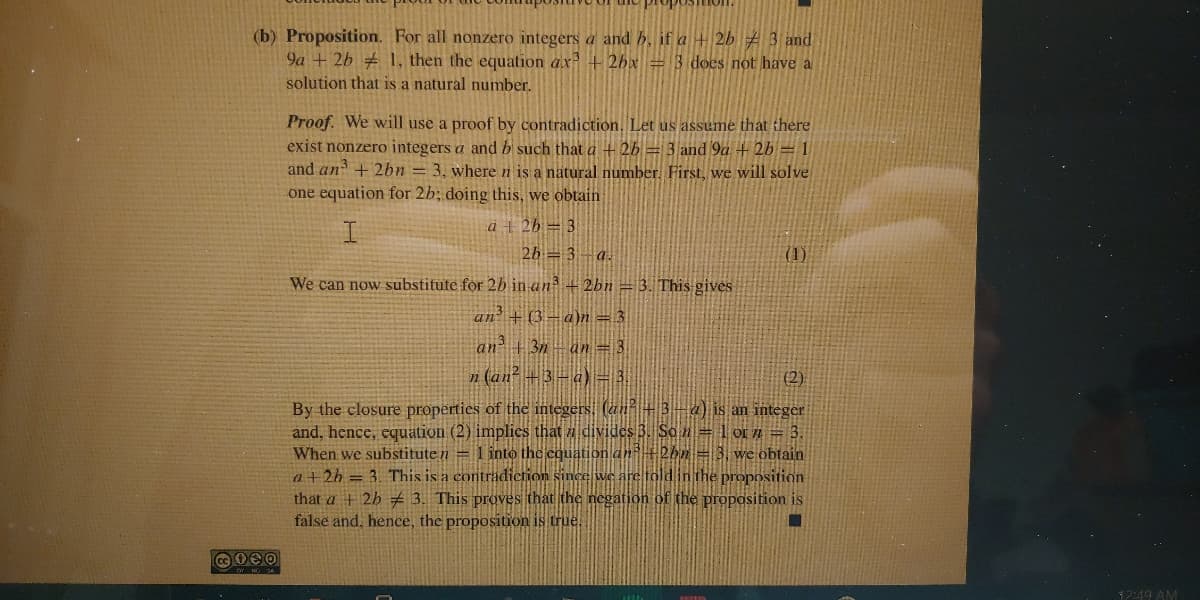I'm supposed to evaluate the proof, edit if there are errors or confirm that it is correct
I'm supposed to evaluate the proof, edit if there are errors or confirm that it is correct
Algebra: Structure And Method, Book 1
(REV)00th Edition
ISBN:9780395977224
Author:Richard G. Brown, Mary P. Dolciani, Robert H. Sorgenfrey, William L. Cole
Publisher:Richard G. Brown, Mary P. Dolciani, Robert H. Sorgenfrey, William L. Cole
Chapter11: Rational And Irrational Numbers
Section11.1: Properties Of Rational Numbers
Problem 36WE
Related questions
Topic Video
Question
100%
I'm supposed to evaluate the proof, edit if there are errors or confirm that it is correct

Transcribed Image Text:(b) Proposition. For all nonzero integers a and b, if a + 2b # 3 and
9a + 2b 1, then the equation ax +2bx = 3 does not have a
solution that is a natural number.
Proof. We will use a proof by contradiction. Let us assume that there
exist nonzero integers a and b such that a + 26 = 3 and 9a + 2b = 1
and an + 2bn = 3, where n is a natural number. First, we will solve
one equation for 2b; doing this, we obtain
a + 26 = 3
26 = 3– a.
(1)
We can now substitute for 2b in an + 2bn = 3. This gives
an + (3-a)n =3
an +3n-an = 3
n (an? +3-a)= 3.
(2)
By the closure properties of the integers. (an+3-4) is an integer
and, hence, equation (2) implics that divides B. So n= 1 or Tn
When we substitute n = 1 into the equation an +2bn = 3, we obtain
a+2h = 3. This is a contrădiction since we are toldinthe proposition
that a + 2h # 3. This proves that the negation of the proposition is
false and, hence, the proposition is true.
12:49 AM
Expert Solution
This question has been solved!
Explore an expertly crafted, step-by-step solution for a thorough understanding of key concepts.
This is a popular solution!
Trending now
This is a popular solution!
Step by step
Solved in 2 steps

Knowledge Booster
Learn more about
Need a deep-dive on the concept behind this application? Look no further. Learn more about this topic, advanced-math and related others by exploring similar questions and additional content below.Recommended textbooks for you

Algebra: Structure And Method, Book 1
Algebra
ISBN:
9780395977224
Author:
Richard G. Brown, Mary P. Dolciani, Robert H. Sorgenfrey, William L. Cole
Publisher:
McDougal Littell

Elements Of Modern Algebra
Algebra
ISBN:
9781285463230
Author:
Gilbert, Linda, Jimmie
Publisher:
Cengage Learning,

Algebra & Trigonometry with Analytic Geometry
Algebra
ISBN:
9781133382119
Author:
Swokowski
Publisher:
Cengage

Algebra: Structure And Method, Book 1
Algebra
ISBN:
9780395977224
Author:
Richard G. Brown, Mary P. Dolciani, Robert H. Sorgenfrey, William L. Cole
Publisher:
McDougal Littell

Elements Of Modern Algebra
Algebra
ISBN:
9781285463230
Author:
Gilbert, Linda, Jimmie
Publisher:
Cengage Learning,

Algebra & Trigonometry with Analytic Geometry
Algebra
ISBN:
9781133382119
Author:
Swokowski
Publisher:
Cengage

College Algebra (MindTap Course List)
Algebra
ISBN:
9781305652231
Author:
R. David Gustafson, Jeff Hughes
Publisher:
Cengage Learning